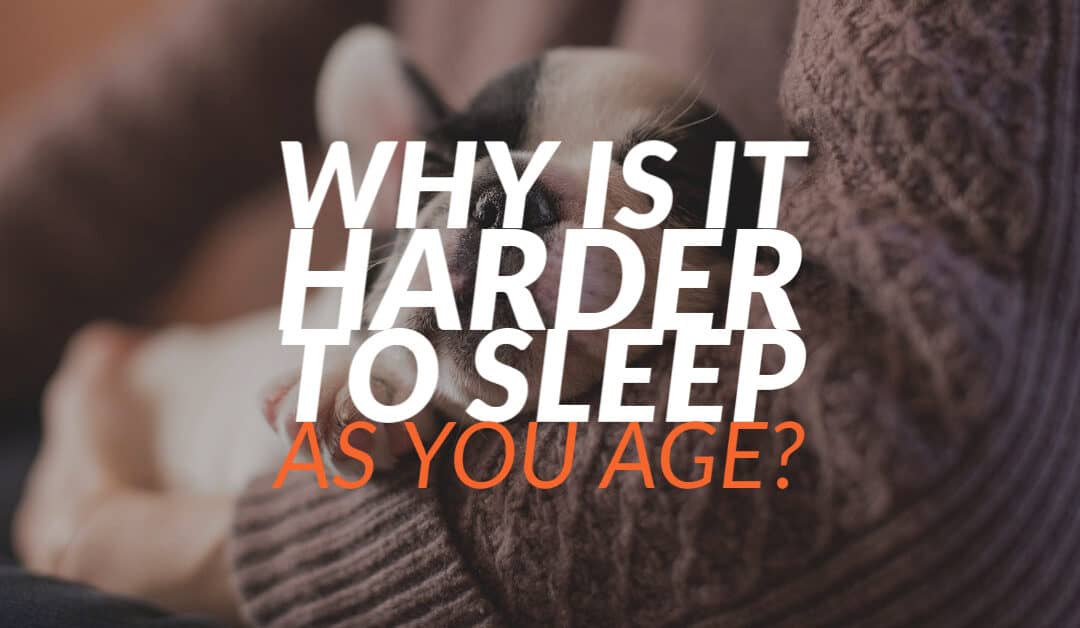Most healthy older adults need 7-8 hours of sleep each night to feel refreshed. But as you age, your sleep patterns may change, and insomnia, a common sleep disorder, can affect your overall well-being. If you’re experiencing trouble sleeping as an older adult, rest assured, you’re not alone. The prevalence of insomnia symptoms in older adults ranges from 30% to 48%. (1) Chronic fatigue and low energy resulting from poor sleep can make it challenging to manage daily tasks effectively. Let’s delve into why sleep becomes more elusive as you age and explore strategies to improve sleep quality.
How Do Insomnia Issues Look?
Sleep issues can manifest in various ways as you age. You may struggle with trouble falling asleep initially, experience frequent awakenings during the night, or find yourself waking up too early in the morning. Additionally, conditions like sleep apnea, restless legs, or an overactive mind can disrupt your sleep patterns, leading to daytime exhaustion and the need for frequent naps.
Lifestyle Changes
As we age, our lifestyles often transition to a slower pace, especially during retirement. Maintaining good sleep habits, such as a consistent bedtime and wake-up time, can help regulate your body clock and promote better sleep. Without the structure of a daily routine, your sleep schedule may become erratic, impacting sleep quality. Establishing a consistent bedtime and wake-up time can help regulate your body clock and promote better sleep. Additionally, avoiding alcohol and certain medications known to disrupt sleep can contribute to improved sleep quality.
Medications and Alcohol
Lifestyle changes involving alcohol or prescription drugs can also interfere with your sleep. A correlation exists between excess intake of alcohol and poor sleep quality. Alcohol impacts sleep stages as a central nervous system depressant. Alcohol impacts the sleep cycle by altering the time spent in each sleep stage, leading to disrupted and less restorative sleep. Acting as a sedative, alcohol may help you fall asleep quicker but reduces your quality of sleep. You may even wake up feeling as though you did not sleep at all.
There is a reason your quality of sleep after drinking is poor. The depressant effect of alcohol impacts the length of time you spend in each stage of sleep. As the body metabolizes alcohol, these stages can be disrupted, creating imbalances throughout sleep. Your sleep may be restless with more movement, and you may wake up throughout the night uncomfortable and restless.
Prescription medications often contribute to poor sleep quality also. The stimulant or depressant effects of any drug can set you up for disrupted sleep patterns. Almost 40% of Americans 65 years and older take 5 or more prescription medications. (2) “Antihistamines and opiates may cause daytime drowsiness, while medications such as antidepressants and corticosteroids may keep older people awake and contribute to the symptoms of insomnia. The interactions of multiple medications may cause unanticipated effects on sleep.” (3)
If you think your medicines may contribute to your poor sleep quality, see your doctor to evaluate each medication and any side effects or interactions fully.
Natural Aging Changes
As we age, our bodies sometimes produce less of the hormones needed for quality of life. Melatonin production may decrease as you age. This hormone helps coordinate your circadian rhythms, your internal clock, and the induction of sleep.
If you watch TV or play on your phone at night, the light exposure may block your melatonin production. This is because your body produces melatonin when you experience darkness. Melatonin may also play other important roles in the body beyond sleep.
Trying a supplement containing melatonin may help you get to sleep and stay asleep longer. However, some find that melatonin causes side effects such as:
- Headache
- Dizziness
- Nausea
- Drowsiness
If you decide to try a new supplement, always start slow and consult your doctor to ensure it doesn’t react with the medications you already take.
Physical Health and Mental Health Issues
Physical and mental health issues can also affect your quality of sleep. Addressing these health issues is essential for encouraging quality sleep. According to the National Council on Aging,” older adults are disproportionately affected by chronic conditions, such as diabetes, arthritis, and heart disease. Eighty percent have at least one chronic condition, and nearly 70% of Medicare beneficiaries have two or more.”
Pain or discomfort can keep you awake at night and often does for older adults with chronic health conditions, leading to feeling tired during the day. “24% of people between 65 and 84 years old reported being diagnosed with four or more health conditions. Those with multiple health conditions were more likely to report getting less than six hours of sleep, having poor sleep quality, and experiencing symptoms of a sleep disorder.” (3)
If your medical condition disrupts your sleep, let your doctor know about your sleep struggles. Sometimes a doctor can help you find a different medication that treats your condition but works better in your body and allows restful nights of sleep.
We Can Help
If you’re struggling with sleep issues, our team of ENT specialists at Enticare can provide tailored solutions to address your specific needs. Our team of ENT specialists is well-versed in sleep medicine and can provide tailored solutions to address your specific needs. Whether it’s diagnosing and treating conditions like snoring or sleep apnea or adjusting medications to improve sleep quality, we’re here to help. Contact us at 480-214-9000 to schedule a consultation and take the first step towards better sleep.
Sleeping less as you age doesn’t have to be inevitable. With the right strategies and professional guidance, you can improve your sleep quality and overall well-being for a healthier, more vibrant life.

